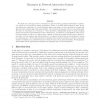Free Online Productivity Tools
i2Speak
i2Symbol
i2OCR
iTex2Img
iWeb2Print
iWeb2Shot
i2Type
iPdf2Split
iPdf2Merge
i2Bopomofo
i2Arabic
i2Style
i2Image
i2PDF
iLatex2Rtf
Sci2ools
112
click to vote
WDAG
2009
Springer
2009
Springer
Dynamics in Network Interaction Games
We study the convergence times of dynamics in games involving graphical relationships of players. Our model of local interaction games generalizes a variety of recently studied games in game theory and distributed computing. In a local interaction game each agent is a node embedded in a graph and plays the same 2-player game with each neighbor. He can choose his strategy only once and must apply his choice in each game he is involved in. This represents a fundamental model of decision making with local interaction and distributed control. Furthermore, we introduce a generalization called 2-type interaction games, in which one 2-player game is played on edges and possibly another game is played on non-edges. For the popular case with symmetric 2 × 2 games, we show that several dynamics converge in polynomial time. This includes arbitrary sequential better response dynamics, as well as concurrent dynamics resulting from a distributed protocol that does not rely on global knowledge. We ...
Related Content
| Added | 25 May 2010 |
| Updated | 25 May 2010 |
| Type | Conference |
| Year | 2009 |
| Where | WDAG |
| Authors | Martin Hoefer, Siddharth Suri |
Comments (0)

